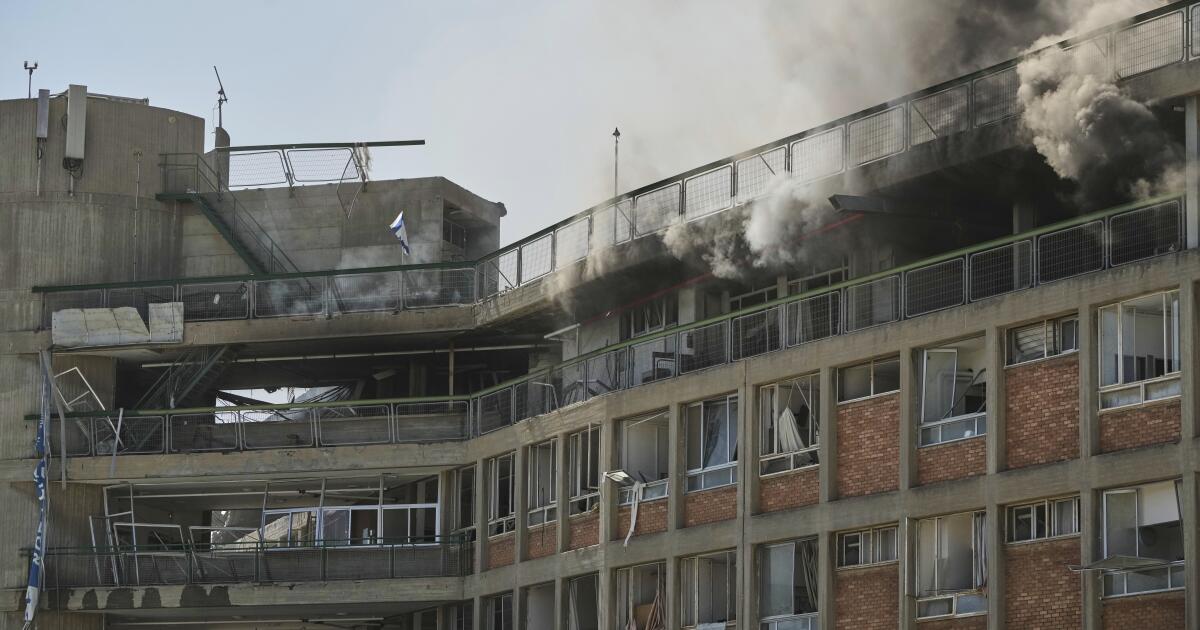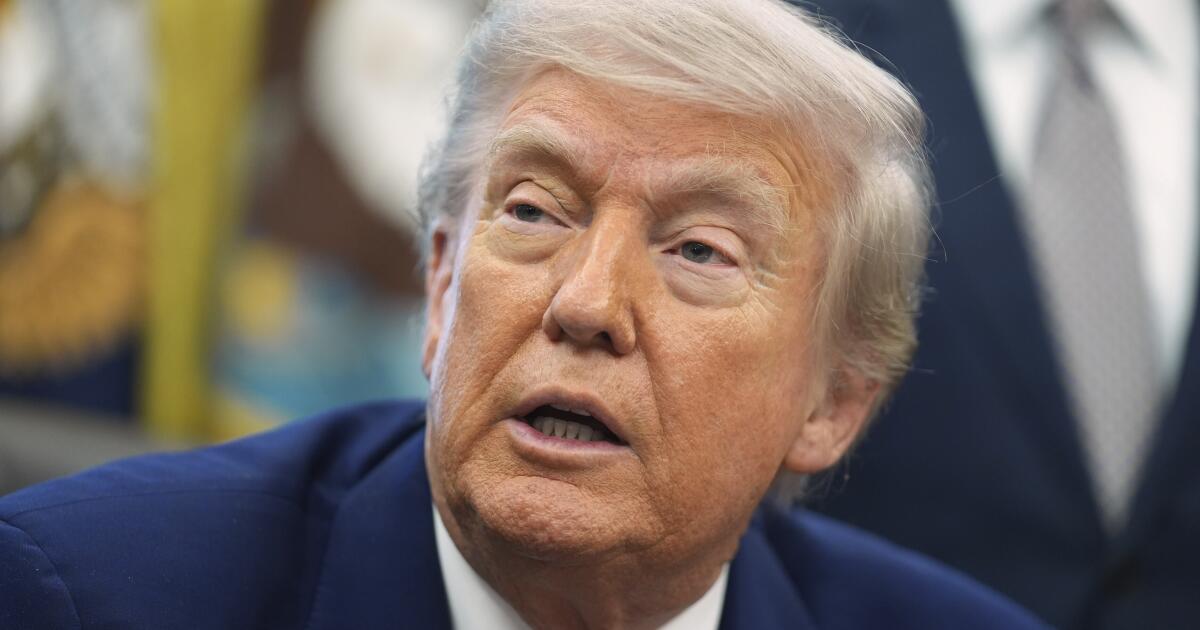Trump says he’ll decide within two weeks whether U.S. will attack Iran
BEERSHEBA, Israel — As Israel and Iran exchanged more attacks on Thursday, President Trump sought to keep open the door to diplomacy on Tehran’s nuclear program, saying he would make up his mind within two weeks on whether the U.S. military will get directly involved in the conflict.
“Based on the fact that there’s a substantial chance of negotiations that may or may not take place with Iran in the near future, I will make my decision whether or not to go within the next two weeks,” Karoline Leavitt, the White House press secretary, told reporters, reading out Trump’s statement.
Trump has been weighing whether to attack Iran by striking its well-defended Fordo uranium enrichment facility, which is buried under a mountain and widely considered to be out of reach of all but America’s “bunker-buster” bombs.
Earlier in the day, Israel’s defense minister threatened Iran’s supreme leader after Iranian missiles crashed into a major hospital in southern Israel and hit residential buildings near Tel Aviv, wounding at least 240 people. As rescuers wheeled patients out of the smoldering hospital, Israeli warplanes launched their latest attack on Iran’s nuclear program.
Israeli Defense Minister Israel Katz blamed Iranian Supreme Leader Ayatollah Ali Khamenei for Thursday’s barrage and said the military “has been instructed and knows that in order to achieve all of its goals, this man absolutely should not continue to exist.”
Prime Minister Benjamin Netanyahu said he trusted that Trump would “do what’s best for America.”
“I can tell you that they’re already helping a lot,” Netanyahu said from the rubble and shattered glass around the Soroka Medical Center in Israel’s southern city of Beersheba.
The open conflict between Israel and Iran erupted last Friday with a surprise wave of Israeli airstrikes targeting nuclear and military sites, top generals and nuclear scientists. At least 639 people, including 263 civilians, have been killed in Iran and more than 1,300 wounded, according to a Washington-based Iranian human rights group.
Iran has retaliated by firing hundreds of missiles and drones, killing at least 24 people in Israel and wounding hundreds.
More than 200 wounded, including dozens in the hospital strike
At least 240 people were wounded by the latest Iranian attack on Israel, including 80 patients and medical workers wounded in the strike on the Soroka Medical Center. The vast majority were lightly wounded, as much of the hospital building had been evacuated in recent days.
Israel’s Home Front Command said that one of the Iranian ballistic missiles fired Thursday morning had been rigged with fragmenting cluster munitions. Rather than a conventional warhead, a cluster munition warhead carries dozens of submunitions that can explode on impact, showering small bomblets around a large area and posing major safety risks on the ground. The Israeli military did not say where that missile had been fired.
Iranian officials insisted that they had not sought to strike the hospital and claimed the attack hit a facility belonging to the Israeli military’s elite technological unit, called C4i. The website for the Gav-Yam Negev advanced technologies park, some 2 miles from the hospital, said C4i had a branch campus in the area.
The Israeli army did not respond to a request for comment. An Israeli military official, speaking on condition of anonymity in line with regulations, acknowledged that there was no specific intelligence that Iran had planned to target the hospital.
Many hospitals in Israel, including Soroka, had activated emergency plans in the last week. They converted parking garages to wards and transferred vulnerable patients underground.
Israel also has a fortified, subterranean blood bank that kicked into action after Hamas’ Oct. 7, 2023, attack ignited the latest war in the Gaza Strip.
Doctors at Soroka said that the Iranian missile struck almost immediately after air raid sirens went off, causing a loud explosion that could be heard from a safe room. The strike inflicted the greatest damage on an old surgery building and affected key infrastructure, including gas, water and air-conditioning systems, the medical center said.
The hospital, which provides services to around 1 million residents of Israel’s south, had been caring for 700 patients at the time of the attack. After the strike, the hospital closed to all patients except for life-threatening cases.
Iran has fired 450 missiles and 1,000 drones at Israel since the conflict began, according to Israeli army estimates, though most have been shot down by Israel’s multitiered air defenses.
Iran rejects calls to surrender or end its nuclear program
Iran has long maintained its nuclear program is for peaceful purposes. But it is the only non-nuclear-weapon state to enrich uranium up to 60%, a short, technical step away from weapons-grade levels of 90%.
Israel is widely believed to be the only country with a nuclear weapons program in the Middle East, but has never acknowledged the existence of its arsenal.
In the last few days, the Israeli air campaign has targeted Iran’s enrichment site at Natanz, centrifuge workshops around Tehran, a nuclear site in Isfahan and what the army assesses to be most of Iran’s ballistic missile launchers. The destruction of those launchers has contributed to the steady decline in Iranian attacks since the start of the conflict.
On Thursday, antiaircraft artillery was clearly audible across Tehran and witnesses in the central city of Isfahan reported seeing antiaircraft fire after nightfall.
In announcing that he would take up to two more weeks to decide whether to strike Iran, President Trump opened up diplomatic options with the apparent hope Iran would make concessions after suffering major military losses.
Already, a new diplomatic initiative seemed to be underway as Iranian Foreign Minister Abbas Araghchi prepared to travel Friday to Geneva for meetings with the European Union’s top diplomat, and with his counterparts from the United Kingdom, France and Germany.
But at least publicly, Iran has struck a hard line.
Iran’s supreme leader on Wednesday rejected U.S. calls for surrender and warned that any American military involvement by the Americans would cause “irreparable damage to them.”
Parliament speaker Mohammad Bagher Qalibaf on Thursday criticized Trump for using military pressure to gain an advantage in nuclear negotiations.
“The delusional American president knows that he cannot impose peace on us by imposing war and threatening us,” he said.
Iran agreed to redesign Arak to address nuclear concerns
Israel’s military said Thursday its fighter jets targeted the Arak heavy water reactor, some 155 miles southwest of Tehran, in order to prevent it from being used to produce plutonium.
Iranian state TV said there was “no radiation danger whatsoever” around the Arak site, which it said had been evacuated ahead of the strike.
Heavy water helps cool nuclear reactors, but it produces plutonium as a byproduct that can potentially be used in nuclear weapons. That would provide Iran another path to the bomb beyond enriched uranium, should it choose to pursue the weapon.
Iran had agreed under its 2015 nuclear deal with world powers to redesign the facility to alleviate proliferation concerns. That work was never completed.
The reactor became a point of contention after Trump withdrew from the nuclear deal in 2018. Ali Akbar Salehi, a high-ranking nuclear official in Iran, said in 2019 that Tehran bought extra parts to replace a portion of the reactor that it had poured concrete into under the deal.
Israel said strikes were carried out “in order to prevent the reactor from being restored and used for nuclear weapons development.”
The International Atomic Energy Agency has said that due to restrictions imposed by Iran on inspectors, the U.N. nuclear watchdog has lost “continuity of knowledge” about Iran’s heavy water production — meaning it could not absolutely verify Tehran’s production and stockpile.
Mednick, Melzer and Gambrell write for the Associated Press. Melzer reported from Tel Aviv, and Gambrell from Dubai. AP writer Melanie Lidman in Tel Aviv and Ellen Knickmeyer in Washington contributed to this report.

